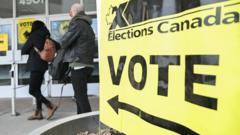As Canada approaches a critical election, the influence of US President Donald Trump's actions, including tariffs and remarks about Canada, has dynamically altered the political landscape, intensifying the race between parties.
Canada's Election: Transformative Effects of Trump’s Leadership

Canada's Election: Transformative Effects of Trump’s Leadership
Canadians prepare to vote amid an election reshaped by US politics.
Canadians will head to the polls on Monday, facing a pivotal election influenced heavily by US President Donald Trump's recent rhetoric and policies. Initially, the Conservative Party, led by Pierre Poilievre, seemed poised for a significant victory, but the political atmosphere drastically shifted following Trump's controversial statements suggesting annexation and imposing tariffs on Canadian goods.
Recent polls indicate that Mark Carney's Liberal Party has gained a slight lead as the campaign draws to a close. The recent tragic car ramming attack in Vancouver, which claimed the lives of 11 individuals, cast a somber mood on the final days of campaigning, forcing both major party leaders to adjust their schedules to respond to the unfolding crisis.
Carney, the incumbent Prime Minister, cancelled a campaign stop to address the nation and emphasized national unity threats posed by Trump, asserting the need for Canada to strengthen ties with other reliable trade partners such as the UK and the EU. At a campaign event in Saskatchewan, he characterized the current relationship with the US as permanently altered.
Conversely, Poilievre urges Canadians to embrace change, framing his campaign around the challenges of living costs and a decade of perceived Liberal governance failures. His final campaign events focused on Ontario, aiming to capture seats in a province critical to the election outcome with a total of 122 parliamentary seats.
The election also presents challenges for smaller parties, including the left-leaning NDP led by Jagmeet Singh and the Bloc Québécois, who struggle for visibility as the two main parties dominate discussions. Singh, affected by the recent tragedy, paused campaign events to support community sentiments and highlight the importance of voting for NDP candidates to ensure checks on power in government.
Though Trump remained silent about the electoral outcome, his administration's ongoing stance on Canada’s status continues to loom large over the Canadian electorate, significantly shaping public sentiment. Early voting statistics have already broken records, with over 7 million Canadians casting ballots ahead of election day.
As the final votes are set to be cast across six time zones on Monday, the outcome will not only signal Canada’s political direction but also reflect the deep political divisions intensified by external influences. The stakes are high, and Canadians are reminded that this election could redefine national identity amidst rising sentiments of nationalism.






















